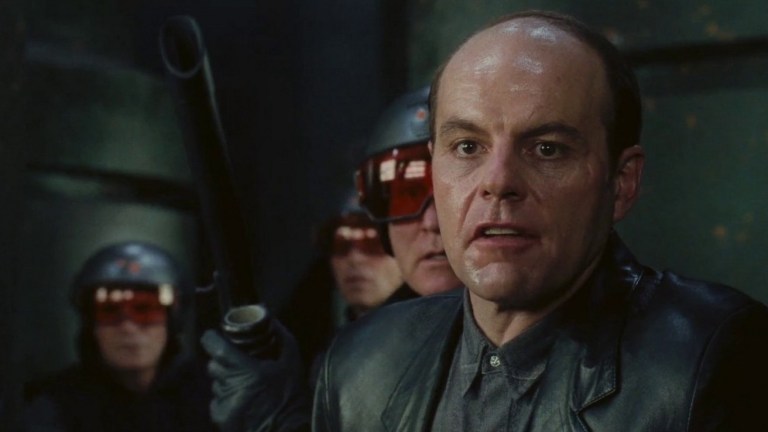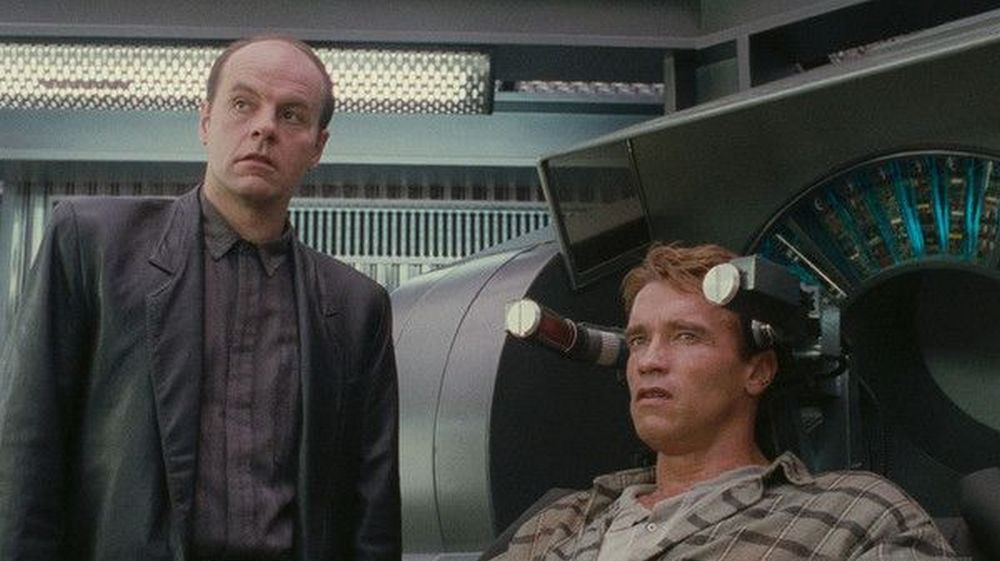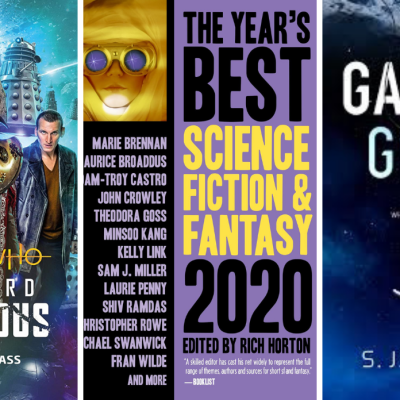How Total Recall Brought a Memorable Villain to Life
Total Recall villain Michael Ironside has good memories of working on the classic 1990 sci-fi movie.

It was 30 years ago that TriStar Pictures released Total Recall, a sci-fi action movie directed by Paul Verhoeven and starring Arnold Schwarzenegger, Ronny Cox, Sharon Stone, Michael Ironside, and Rachel Ticotin. Based loosely on a story by Philip K. Dick called “We Can Remember It For You Wholesale,” the movie starred Schwarzenegger as Douglas Quaid, a construction worker in the year 2084 who begins having strange dreams about a mysterious woman and the Earth colony that exists on Mars.
His wife Lori (Stone) dismisses the dreams, but it turns out they’re not dreams at all but memories: Quaid is actually a secret agent named Hauser who once worked for the governor of the Martian colony (Cox) but has had his memories wiped and replaced with false ones. Lori is not his wife at all, but an operative for the governor and the wife of Richter (Ironside), the governor’s ruthless fixer. With the help of Melina (Ticotin), the woman from his dreams, Hauser/Quaid finds himself caught between a rebellion among the colonists and a conspiracy surrounding the existence of an alien artifact found on Mars.
Verhoeven, fresh off the success of his wildly violent and satirical RoboCop, amped up the violence and action in Total Recall while also rolling out a slew of visual effects that helped turn the movie into one of the most memorable of the early 1990s. The movie also provided a showcase for Schwarzenegger to play a more vulnerable character, while Ironside — who had first gained notice as a villain in David Cronenberg’s Scanners nine years earlier — delivered a vivid turn as the relentless and aggrieved Richter.
With a 4K remaster of the film freshly issued on Blu-ray in the U.K. (in a snazzy box set) and the U.S., Den of Geek had the chance to speak about Total Recall with the Canadian-born Ironside, whose other fan-favorite film appearances (often as the toughest of tough guys) include roles in Starship Troopers, Top Gun, Highlander II: The Quickening, The Perfect Storm, and hundreds more.
Den of Geek: How did you get involved with Total Recall?
Michael Ironside: I had met Paul Verhoeven for RoboCop, to play RoboCop. It was between Peter Weller and me. We’d had a couple of conversations and meetings, and Rob Bottin, who had done special effects for RoboCop, and later for Total Recall, he came in and said, “Look, if I create a suit for Michael it’s going to look like a Sherman tank.” Peter was much slighter than I was, so that was the deciding factor.
Paul offered me the part of that kind of psychotic character that’s full of drugs and everything on RoboCop. I was in the middle of shooting a film called Extreme Prejudice with Nick Nolte and Maria Conchita Alonso and Powers Boothe. I just finished a death sequence, and I went and met Paul at lunch and when he offered it to me I said, “Thank you and good luck with the film, but I don’t think I can play another psychopath right now.” And Paul said, “Would you consider it?” And I said, “No, I don’t think I can”…And I remember thinking, what an idiot, why aren’t you on this film? Because I was a huge fan of Paul’s from his European films like Spetters.
I’m in the middle of processing this stuff and I said, “Please accept my apology and all the best with the film, blah, blah, blah.” And because of turning down that and another film I turned down at the time, because I didn’t want to play a rapist, the word got out that I was difficult to work with, and I’m anything but difficult to work with. So I met with Paul for Total Recall and they said, “We’re not offering you the part. Are you willing to audition?” I said, “Absolutely.”
There were a lot of writers on Total Recall, and the script went through a lot of changes. How much of that were you there for?
Paul has never shied away from technology and trying new things…There were massive production details and stuff on Total Recall. The script wasn’t as much a concern for me as the innovations we were dealing with. You know what I mean? We were dealing with computerized sleds. The cameras were on computerized sleds so that you would do a sequence where it comes in and then you’d step in and do another side of it where they would match so they could overlap the shots and put you in things.
So for me the struggle on that film was trying to keep a sense of organic authenticity where you’re dealing with a lot of technology. The script changing has never been a big deal. I get a sense of what we’re doing when I read the script, I know myself and then I concentrate on a daily basis of what we’re doing on any given sequence. So the actual continuity of the story and stuff was not as important as concentrating on being real in every given moment, and trusting the story. My job is to show up, support the director and support his or hers storytelling. When you get somebody who’s deft and in control as Paul is it’s easy to do.
If I didn’t have a good time I wouldn’t do it. I just love working with Paul. I love that crew. It was a joy to go to work. Every day you felt like you were learning something.
Do you remember your first scene on the movie?
My very first shot on the film was kissing Sharon Stone. My very first scene was where I come in her apartment after she’s had that whole fight sequence and I grab her and kiss her. My wife was with me. It was my very first scene. It was Friday night, we got all the stuff set up and then when I got there and I said, “What’s the first scene up?” Paul said, “The apartment scene with Sharon.” And I went, “Thank you. You couldn’t have me just run across the street and shoot somebody?” I told my wife, “I’ve got to do the kissing scene and I’m not sure how to do it.” And Karen said, “Well, ask for her help.”
Karen said, “I’ll come just to make it feel safer for you.” So she was standing off camera and I walked up to Sharon. I said, “I’ve never really done something like that.” And she cut me right off and said, “You mean the kissing and stuff like that?” And I said, “Yeah.” And she goes, “Don’t worry.” She looked right at my wife and she says, “I’ll look after this.” And she actually did. I walked in, I grabbed her around the waist and she grabbed me. It was the right tone — the scene had that kind of cold blooded, sociopathic tone to it. And I felt safe. From that moment on I felt safe.
Richter isn’t this one-dimensional villain. If you look at it from his perspective he was just a guy whose wife’s job has been pretending to love another guy.
I have a tendency to want to protect my characters, because I make them as human as possible. I’m not trying to look good up there. I’m not trying to protect Michael Ironside. I’m trying to create a character. Richter was a very specific type of personality. He’s the Doberman for somebody who’s an authority figure, who has a very set male way of looking at things, and probably not a three-dimensional or four-dimensional way of looking at things, probably two-dimensional: “I’m good. I’m in power, you’re not.” That’s a safety net. It’s not vindictive.
I don’t want to get into all of the meditative stuff here, but there’s only one real basic driving force in the universe and that’s love. Anything other than that is an attempt to get back to it, whether it’s fear, anger, whether people know it or not. That’s the way I look at my characters. They’re basically damaged in some way, but they’re humans. I try to make them as human and as organically correct as possible.
How was it working with Arnold? I understand that he actually did you a great kindness during that shoot and helped with your sister, who was ill.
Well, absolutely. Arnold and I are still friends…Arnold is a very, very smart man, very clever and not clever in a negative way, clever in his way of constantly having to deal with being treated like a caricature or taken for granted, I might say, over the years. My sister had had an operation. She got peritonitis and she had an abdominal infection and stuff up in Canada. And I know it’s hard for people to believe, but this is pre-internet, pre-cell phones when that film was made.
He had a telephone hookup in his trailer, and he said, “I heard your sister is sick.” I’m the oldest of five kids. I have 93 first cousins. We’re a very tight knit pack. Wendy, my sister, she’s the second oldest, she’s my best pal in my whole life. She’s three years younger than me. So he said, “Come, come, come.” We went to his trailer and he said, “We’ll call her.” I said, “What do you mean?” And I was totally oblivious to money and power and stuff. He had a phone set up and we called the hospital where she was at.
I said, “Hey, Wendy, I got somebody here, one of my co-stars here, he wants to talk to you.” And he goes, “Hello Wendy. You’ve got to get…” He listed all these things that could help her. It was touch and go there for a while because of her blood count, the whole thing was down. And we talked for about half an hour. We were having lunch and stuff in his trailer. I got all emotional. I thanked him so much because he didn’t have to fucking do that. He didn’t have to do that. He was very sincere.
I found out afterwards that he called Wendy about every three days. “How’re you doing? Are you keeping yourself fit? Are you doing this, or doing that?” People aren’t what they say, they are what they do. And what Arnold has done over the years, he’s a good man. He’s a good guy. That was his thing.

What else do you remember about shooting the movie?
When I did that fight scene with him on the elevator I had just had my sternum broken. They shut the whole film down. There’s a scene where we come running out and my backup, I can’t remember his name now for some reason, we came running up and as I turned around, he runs in there and he goes, “No, no, no. Don’t shoot! You’ll blow the biosphere,” or something like that. When he ran up, he hit me right in the chest with this Uzi he had and it cracked my sternum and popped two of my ribs out. We only got one take of that and they had to shut the film down after that day was over because I was in pretty much everything they were shooting.
After about three weeks, I get a call saying, “How are you feeling?” I said, “I’m feeling pretty good.” The producer said, “There’s a problem…We’ve got to start up again, but the insurance company won’t allow you back on set unless you can do 50 push-ups.” I went to Beverly Hills to meet the insurance guys at the doctor’s office, and the doctor says, “I got to tell you right up front, when you do this it’s going to re-injure you.” So the insurance guys came in, I got down and I got to about 20 push-ups and I felt it go. The rib come out. It’s kind of like a snap. I started to turn pale, I think, because somewhere around 25, 30 push-ups, the doctor said, “Yeah, yeah, yeah. That’s good enough.”
What happened after that?
I get back and the first thing up was the elevator fight sequence. Paul said, “The very first things you’ve got to do, it’s on a smaller set. It’s not the big sets. You’ve got to do this fight scene with Arnold in this elevator.” And I couldn’t even lift my left arm at that time.
The doctor called up somebody and about an hour later Jim Plunkett walked in. If you don’t know who Jim Plunkett was, he was a quarterback for the Oakland Raiders and I think he won the Super Bowl with the Raiders. The doctor had designed a flat apparatus for Plunkett when he had broken three or four ribs and had to play. You couldn’t take huge, deep breaths, but it kept the sternum and the ribs in place.
I tried it on and he fitted it for me and I went back to Mexico and we did that fight scene with Arnold, and Arnold knew that I was in trouble. But we did that fight scene. We shot all day, a huge fight scene. Most of it was us. He tapped me once, only once. That’s how professional he was and how well that was choreographed.
David Cronenberg, who directed you in your breakout role in Scanners, was attached to direct Total Recall for a while. How do you think it might have been different had he done the film?
When I did Scanners, I was only hired to do the black and white flashback sequence. That’s all I was ever hired for on Scanners. And he said, “I’m thinking of rearranging the script a little and bringing you in more.” So when I was on Scanners I literally got scenes sometimes the night before, sometimes two days before, because he was rewriting the script as we went.
I think the difference would have been that Paul has a tendency to be very socio-political. He’s not as interested in the organics of a character. His storytelling, I’ve noticed, is really about social political comment, the big picture. I think David, on the other hand, deals more with the paranoia, the interior conflicts, the emotional desperation of a character. He deals with things on a much more intellectual, emotional level on the inside where Paul is dealing with the intellectual man in the universe, man in society, society versus man. David is more about man versus himself, man versus his belief systems, man versus religion — what motivates people and what leaves the footprints emotionally on them.
This interview has been edited for length and clarity.
Total Recall is out now in the U.K. in a deluxe 30th anniversary 4K collector’s edition box set and in the U.S. in a new 4K/standard Blu-ray edition.

